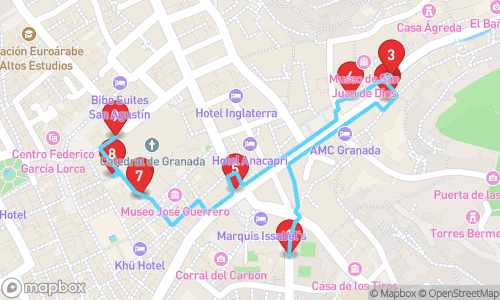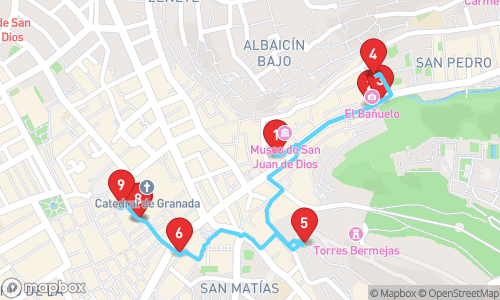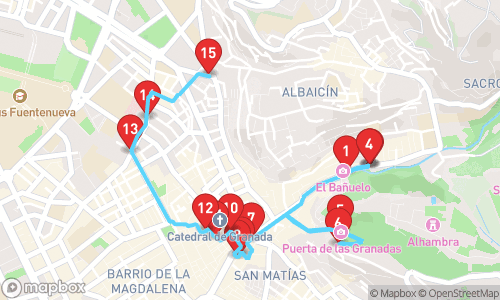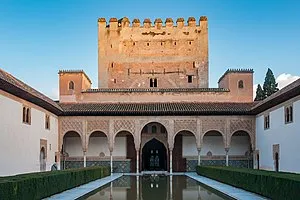
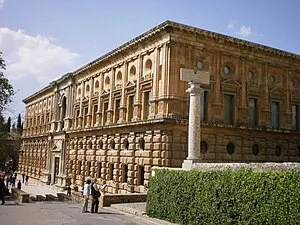
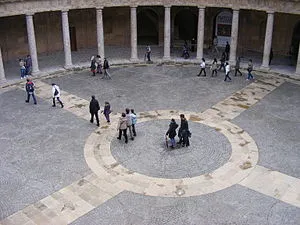
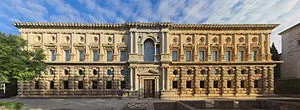
The Enchanting Tapestry of Granada: A Historical & Cultural Odyssey

Tour Guide
Jenny Multilingual
Welcome to Granada! On this GPS guided audio tour, we will visit 16 stops on a route of 3.74km. This tour focusses mainly on general tourism.
Locatello is an app where you can generate personal audio guided tours. Set your preferred distance, guide, language and theme, and a guided tour is created on the spot.
Walking Time
Distance
stops
Language
Tour Stops

Court of the Myrtles
A rectangular courtyard with a central reflective pool, surrounded by myrtle bushes and ornate porticos with stucco decorations, dating from the 14th century. The courtyard's long axis is aligned north-to-south, and it connects various rooms and halls, including the Sala de la Barca and Comares Baths.

Museo de la Alhambra
A museum showcasing a diverse collection of objects found in excavations of the Alhambra and Granada, with exhibits on religious, scientific, ornamental, domestic, and mobility topics with objects from the Peninsular and the East.

Museo Provincial de Bellas Artes
A fine arts museum, the Museo Provincial de Bellas Artes, features an extensive collection of art masterpieces, including works by Juan Sánchez Cotán, Alonso Cano, Mariano Fortuny, and more, highlighting Spanish artistic heritage.

Palace of Charles V
A Renaissance palace with a 17-metre high, 63-metre square plan and a circular patio, characterised by innovative architecture and Roman influences, built by Pedro Machuca and his son Luis, and later restored by Leopoldo Torres Balbás.
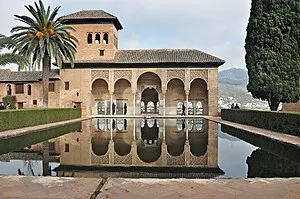
Partal
A pavilion, the Partal, is a 14th-century palatial structure with intricate stucco decoration and a reflecting pool.
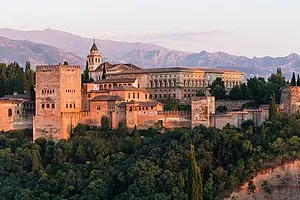
Alhambra
A group of three other Nasrid palaces once existed in the Alhambra complex, but were largely destroyed over the centuries. Two of these, the Palacio del Partal Alto and the Palace of the Convent of San Francisco, have been excavated and incorporated into the complex's gardens and architecture, respectively.
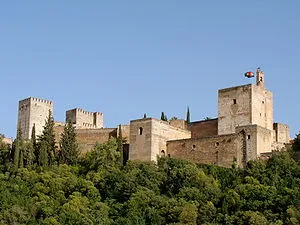
Muralla de la Alcazaba
A medieval tower known as the Torre de la Vela, also called the Torre del Sol or Bell Tower, is a prominent feature of the Alcazaba fortress. It features four levels of chambers with commanding views of the area and has been a symbol of Granada since the Christian conquest.
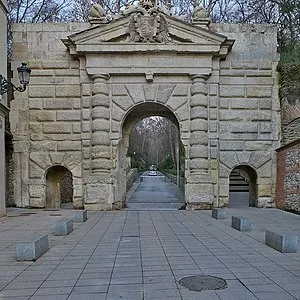
Arc of Granadas
The Gate of the Pomegranates is a historical access point leading to the Nasrid palace, Alhambra, in Granada, Spain, built in the style of Roman triumphal arches with a classic front façade during the Spanish Renaissance.
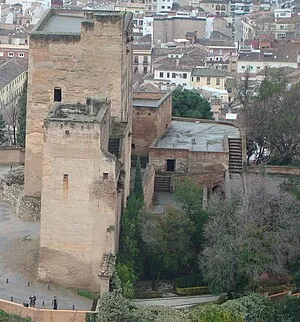
Torres Bermejas Castle
A fortification in Granada, Torres Bermejas Castle consists of three towers of varying sizes, with a central tower having three floors, and features a portal, balcony, and cistern.
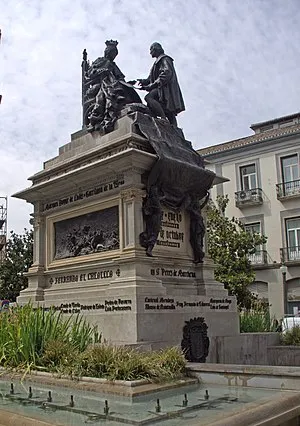
Monument to Isabella I of Castile and Christopher Columbus
A sculptural group depicting a meeting between Isabella I of Castile and Christopher Columbus, created by Mariano Benlliure, featuring a bronze figure of the queen seated on her throne and Columbus bowing to her.
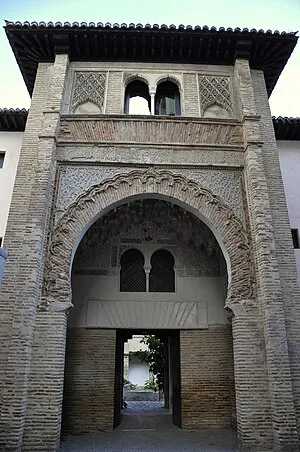
Corral del Carbón
A 14th-century agricultural structure, Corral del Carbón is a monumental funduq with a triangular courtyard and a three-story gallery, featuring Moorish-style ornamentation and a projecting entrance gateway with an iwan-style arch.
Audio Preview
30 sec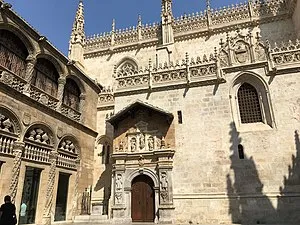
Royal Chapel of Granada
A royal chapel, built between 1505 and 1517, serves as the burial place of Spanish monarchs, including Queen Isabella I and King Ferdinand the Catholic Monarchs. It features a gallery of artworks and items associated with Queen Isabella.
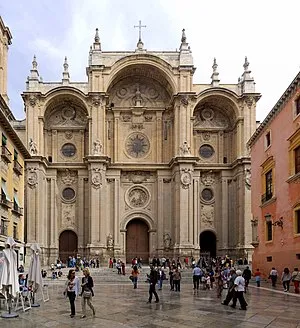
S.A.I. Catedral Metropolitana de la Encarnación
Catholic cathedral dedicated to Santa María de la Encarnación, featuring a blend of Gothic and Renaissance architectural styles.
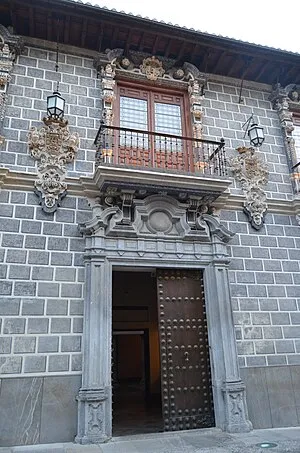
Madrasah of Granada
A palace and the only major madrasa built in al-Andalus, founded in 1349 by Yusuf I, the Nasrid emir of Granada.
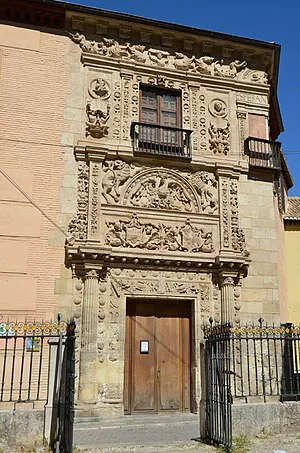
Archaeological Museum of Granada
A museum in the Albayzín district, the Archaeological Museum of Granada was established in 1879, featuring numerous artifacts from various time periods, including Paleolithic, Bronze Age, Roman, and Hispano-Muslim archeology, housed in the 16th-century Castril palace.
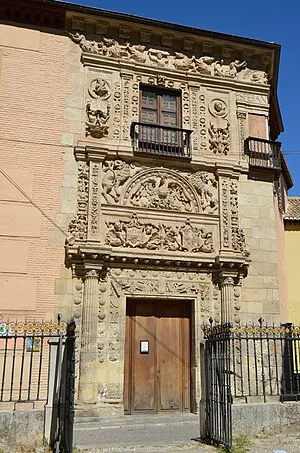
Castril Palace
A Renaissance-style palace, the Castril palace is a museum building in Granada, hosting the Archaeological Museum of Granada. Built in 1539, the palace is attributed to Sebastián de Alcántara and features a distinctive façade with a recorded foundation date.
Download App
Experience this tour and many more with our mobile app. Available for iOS and Android.
Audio Preview
Tour Map
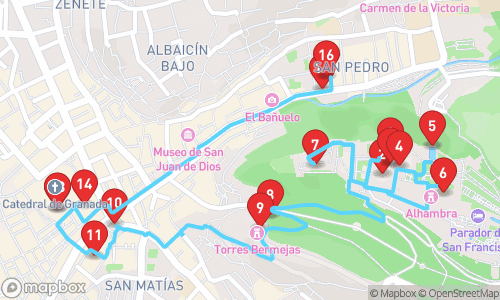
Quick Facts
- ✓GPS-guided navigation
- ✓Professional audio narration
- ✓Offline maps available
- ✓Premium content included
Why Choose This Tour
Expert Local Guide
Narrated by Jenny Multilingual, specializing in general tourism
Flexible Timing
Take the tour at your own pace, any time of day
